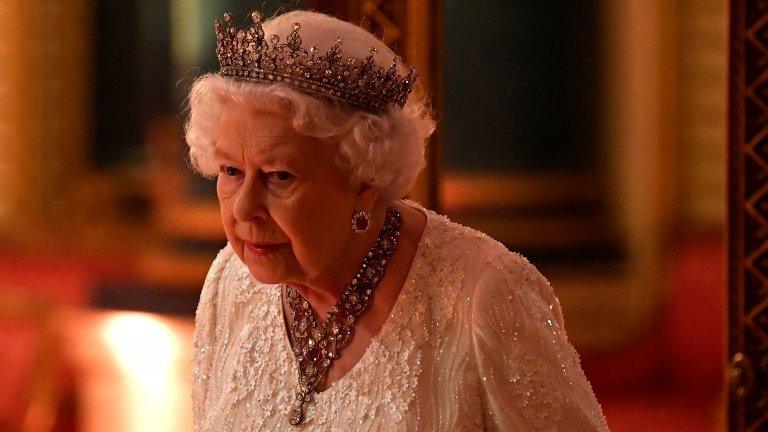'No other options' for Commonwealth head?
- Published
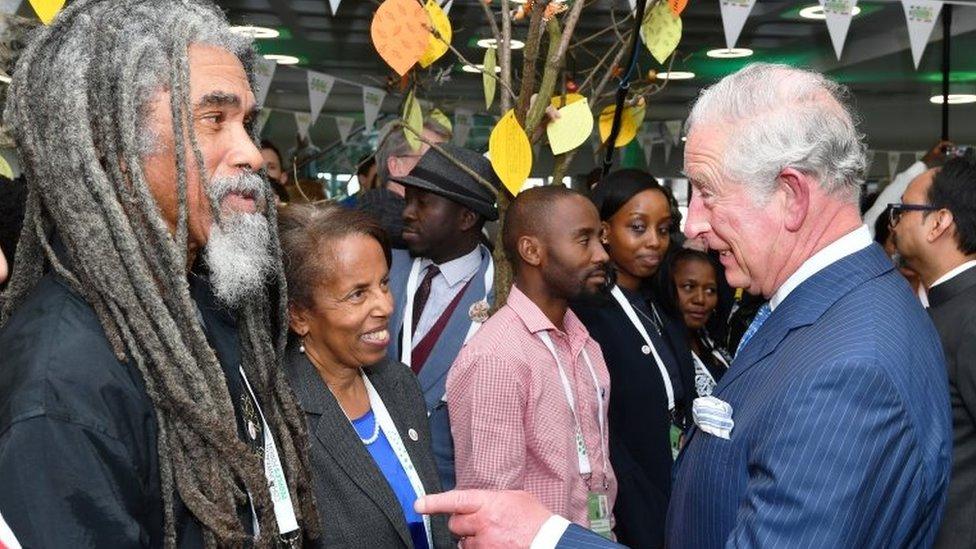
The foundations for the Prince of Wales to take the lead had been laid
The Queen's very public plea that the Prince of Wales should succeed her as head of the Commonwealth may have surprised some of the government leaders sitting in the ballroom of Buckingham Palace.
But it came as no surprise to those within Whitehall who had been planning and campaigning for this moment for years.
In theory, the decision is entirely up to the Commonwealth heads of government. It is not an hereditary role.
Yet Thursday's meeting showed the culmination of a concerted operation by the British government and royal establishment to present this decision as a fait accompli against which it would be almost impossible to argue.
On Friday, the leaders are expected to sign off the deal when they meet for private discussions at Windsor Castle.
First, Prince Charles led the groundwork in recent years by assiduously visiting Commonwealth countries and cultivating their leaders. His website and twitter feed pump out pictures of these trips and events.
And in front of the world leaders, he yet again reinforced his credentials as a candidate.
He said: "For my part, the Commonwealth has been a fundamental feature of my life for as long as I can remember, beginning with my first visit to Malta when I was just five years old.
"I consider myself fortunate over the years to have been able to meet and talk with so many of the giants of the Commonwealth - Sir Robert Menzies; Kwame Nkrumah; Sir Keith Holyoake; Jomo Kenyatta; Pierre Trudeau; Kenneth Kaunda; Julius Nyerere; Lee Kuan Yew and many more.
"On the foundations they laid, the modern Commonwealth has a vital role to play in building bridges between our countries, fairer societies within them and a more secure world around them."
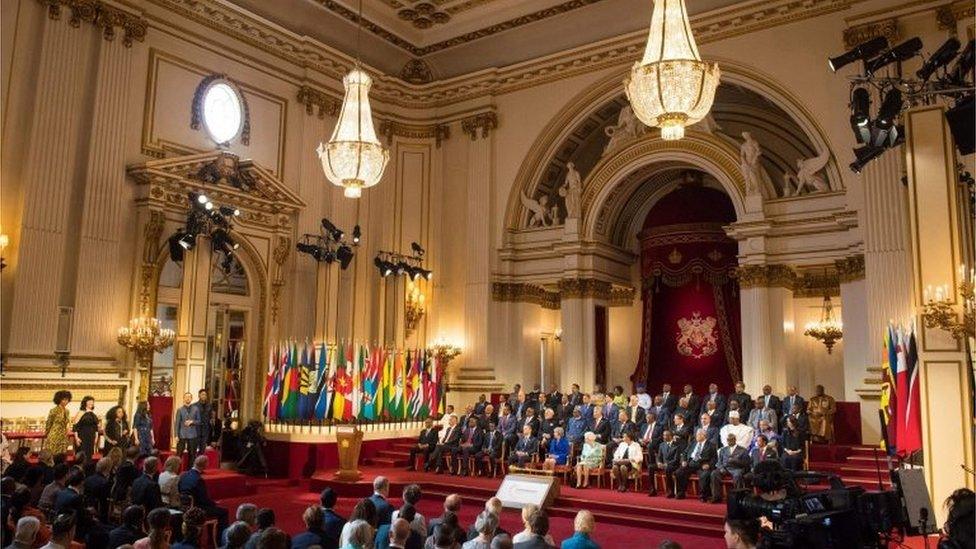
The decision over who succeeds Her Majesty needs to be unanimous
In politics, that could easily be mistaken for a stump speech.
Crucially, the Prince has worked hard to secure the support of India by going out of his way last year to visit the prime minister, Narendra Modi, to convince him to come to this summit.
India is a key and growing player in the Commonwealth, one of its largest economies with almost half its population. So its voice matters.
And insiders say that India is onside. The Queen did not hold a private audience with Mr Modi on Thursday and host him for dinner for nothing.
Second, the Queen herself has played a significant role. At the last Commonwealth summit in Malta in 2015, she made her views very clear, saying she could not "wish to have been better supported and represented in the Commonwealth than by the Prince of Wales who continues to give so much to it with great distinction".
Queen 'scooped' on own news
This week, though, is almost certainly the last time the 91-year-old monarch will chair the Commonwealth's biennial conference, known by its inelegant acronym, CHOGM.
That and the fact that the royal kitchen sink has been thrown at this summit gave her even greater authority to ask for her son to succeed her.
Who could possibly refuse the direct and public request of such a host amid the grandeur of Buckingham Palace and Windsor Castle? This is a moment of great leverage for the sovereign.
Third, Joseph Muscat, the prime minister of Malta and outgoing chair of the Commonwealth, was roped in to canvas opinion. He has played a key role in these deeply private discussions.
It was significant that it was he and not Her Majesty who first indicated where the wind was blowing.
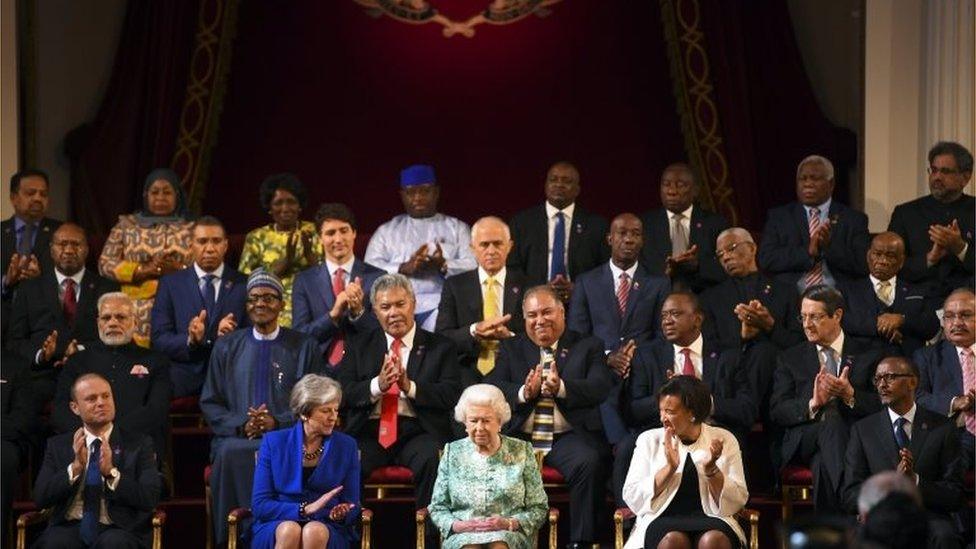
Was this her farewell applause?
It takes some guts to scoop Her Majesty the Queen. Mr Muscat told his fellow Commonwealth leaders: "We are equally elated by the vigour with which His Royal Highness the Prince of Wales actively participates in Commonwealth affairs and puts a strong Commonwealth dimension in his various national and global initiatives.
"We are certain that when he will be called upon to do so, he will provide solid and passionate leadership for our Commonwealth."
And finally, Downing Street played its part, making it very clear on Monday that Prince Charles' succession would be discussed this week.
The Queen's reign may not end for many years but a Downing Street spokesman was adamant about the urgency: "This is obviously a decision that is taken later in the week, and a decision taken by all the members together. I think that all happens on Friday."
For we should not underestimate the importance the British government places in the Commonwealth and the potential risks of severing its links with British royalty.
'No alternative candidate'
After Brexit, ministers are looking to the Commonwealth as a source of greater trade and a global institution in which they can project soft power as part of its much maligned "Global Britain" foreign policy.
Thus was the campaign laid. One Commonwealth source said: "There has been a co-ordinated push to make this happen. It was presented as a done deal."
There are risks in this. Commonwealth countries do not always like being pushed around.
All it would take is for one country to raise a wrinkled eyebrow of doubt to throw a spanner in the works. This, of course, has to be a unanimous decision.
And there has, in the past, been debate about whether the end of the Queen's reign should be a moment for the Commonwealth to reform its leadership, making it less Anglocentric, less connected to its imperial past, perhaps by having elected rotating symbolic leadership.
But there has also been the view that even if the Prince of Wales were seen in a different light to the Queen, the British monarchy provides the Commonwealth with a vital element of continuity and shared institutional memory that is beyond politics.
This is a loosely aligned body of 53 diverse countries with many different values, cultures and beliefs, divided by wealth, geography and size.
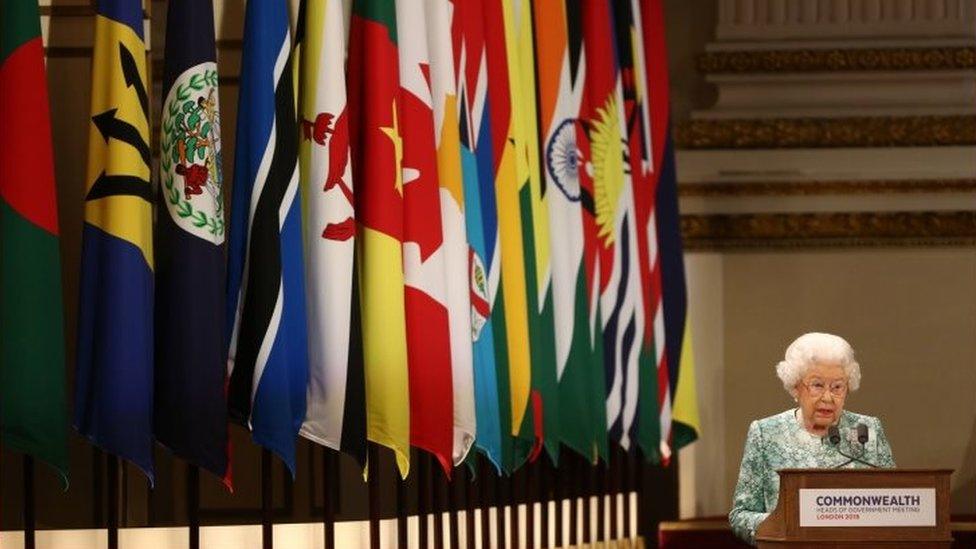
The role is not hereditary and so could go to any leader of the 53 countries
In that context, the Commonwealth is choosing to hold onto one of the few ties that binds it together. There is also no alternative candidate to the Prince of Wales.
And there is also this simple fact: Commonwealth leaders spend enough time scrapping over where their summits should be held and who should chair their secretariat. There is not much appetite for adding to that electoral burden.
So, barring unforeseen objections, the Prince of Wales looks likely to succeed the Queen as head of the Commonwealth.
But note this: the government leaders could have decided that the organisation should always be led by the British head of state, whoever he or she may be. That, however, I am told, is not going to happen.
They will back Prince Charles for now but they will not write a blank cheque to the British royal family in perpetuity. In other words, if the Duke of Cambridge wants the job one day, he is going to have to work for it like his father.
- Published19 April 2018
